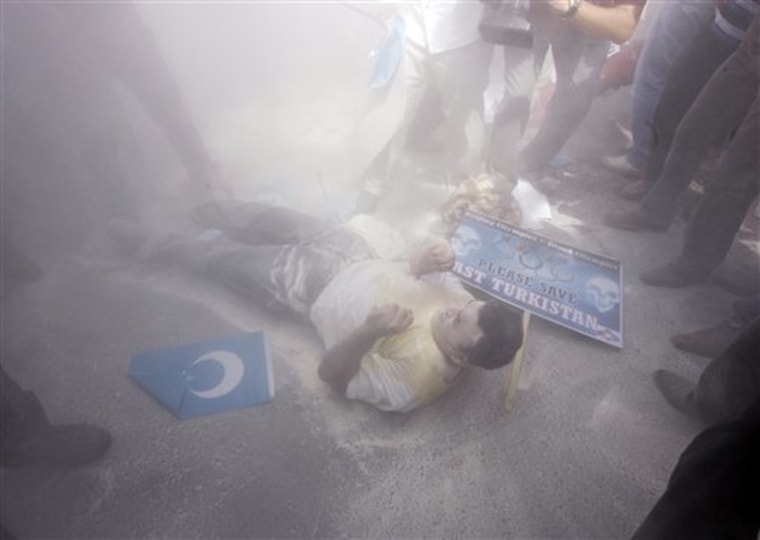A protester set himself on fire outside the Chinese Embassy in the Turkish capital and thousands of Tibetan exiles took to the streets in Nepal, as anti-China demonstrations occurred worldwide to coincide with the start of the Beijing Olympics.
By the end of the day Friday, protests that had begun in Asia also were taking place in London, Paris, Brussels and Amsterdam.
In Ankara, a demonstrator suffered second-degree burns after setting himself on fire during a rally by several hundred ethnic Uighurs, officials said. He was identified as a 35-year-old from Turkey's local Uighur community, an ethnic minority in China seeking independence or greater autonomy.
In Katmandu, Nepal's capital, thousands of Tibetan exiles demonstrated at the Chinese Embassy, shouting, "China, thief: Leave our country. Stop killing in Tibet."
Police forcibly dispersed the protesters, some of whom tried to storm the embassy, police official Ramesh Thapa said. More than 1,000 people were detained for violating a ban on demonstrations — the largest number of Tibetans detained in a single day in Katmandu.
In India, more than 2,000 protesters marched in Dharmsala, a northern hill town that is home to the Tibetan government-in-exile and the Dalai Lama, Tibet's spiritual leader.
In China, three Americans who planned to hold Tibetan flags during the opening ceremony were detained by police as they traveled to Beijing National Stadium, Students for a Free Tibet executive director Lhadon Tethong said. Police did not confirm the incident.
While the spectacle of the opening ceremonies was broadcast on large screens in London's Trafalgar Square, the Chinese Embassy was the focus for protesters railing against the country's treatment of people in Tibet, Sudan, Zimbabwe and Myanmar.
"The Olympics shouldn't have been offered to China on the basis of their human rights record," said Liawang Tsang, whose family fled Tibet nine years ago. But he welcomed the Olympics for putting the spotlight on it.
About 300 people gathered in front of the embassy, most wearing red headbands in memory of people killed in Tibet. A small counter-demonstration took place nearby.
In San Francisco, Buddhist monks holding up the Tibetan flag and chanting led between 200 and 300 protesters bearing banners across the Golden Gate Bridge on Friday. The crowd, clad in yellow, drew honks and the occasional "Free Tibet" cheers from passing tourists.
"The Olympics for China is a giant spectacle, a game, but for us it's much more than that — it's a chance to call attention to what is happening in Tibet," said Tsering Gyurmey, of San Francisco, who is a member of the Tibetan Association of Northern California.
In Paris, a judge reversed a local authority ban on protests around the Chinese Embassy and demonstrators marched there. A man and a woman climbed the front of a five-story building, unfurled a large banner picturing the Olympic rings as handcuffs and attached it to the top floor balcony. Police dragged the pair away when they reached the ground, scaled the building and retrieved the banner, as protesters booed.
Hundreds in Brussels joined the global protest, with five demonstrators standing outside the European Union headquarters with Olympic rings around their necks, bloodstained bandages on their heads and their wrists bound in chains to call for a free Tibet.
In Amsterdam, many protesters ran or cycled from the stadium that hosted the 1928 Olympic Games just outside the city, waving Tibetan flags.
One protester, Lobsang, 30, said he had fled his monastery in Tibet six years ago after being caught with a book written by the Dalai Lama and beaten.
"It's important that we show the world that we stand up for those in prison and dying" in Tibet, he said. "We in free countries should support them."
The Beijing Games have become a focus for activists critical of China on issues ranging from its human rights record and heavy-handed rule in Tibet, to its abortion policies and repression of the Falun Gong spiritual movement.
Beijing considers the Olympic Games a huge source of national pride and is doing all it can to make sure they go off without a hitch — such as ugly television images of protesters scuffling with police.
In China, authorities were on their highest alert, guarding against anyone who might try to take the shine off the opening ceremony watched worldwide.
Beijing's landmark Tiananmen Square was sealed off. Foreigners who have protested in recent days were deported, and Chinese who did the same were in custody. The tight controls imposed by China's autocratic government have so far ensured that the handful of protests in the host city have been small and relatively quiet.
In semiautonomous Hong Kong, Briton Matt Pearce was detained after unfurling two banners on a major bridge reading: "We want human rights and democracy" and "The people of China want freedom from oppression."
Forty other protesters chanted slogans urging China to democratize near one of the venues for the Olympic equestrian event, to be held in Hong Kong.
Tibet activists have stepped up their international campaign against Chinese rule in their homeland since demonstrations erupted in the Tibetan capital in March and Beijing responded with a military crackdown.
Those protests were some of the biggest against almost 50 years of Chinese rule. Many Tibetans insist they were an independent nation before Communist troops invaded in 1950, while Beijing says the Himalayan region has been part of its territory for centuries.
